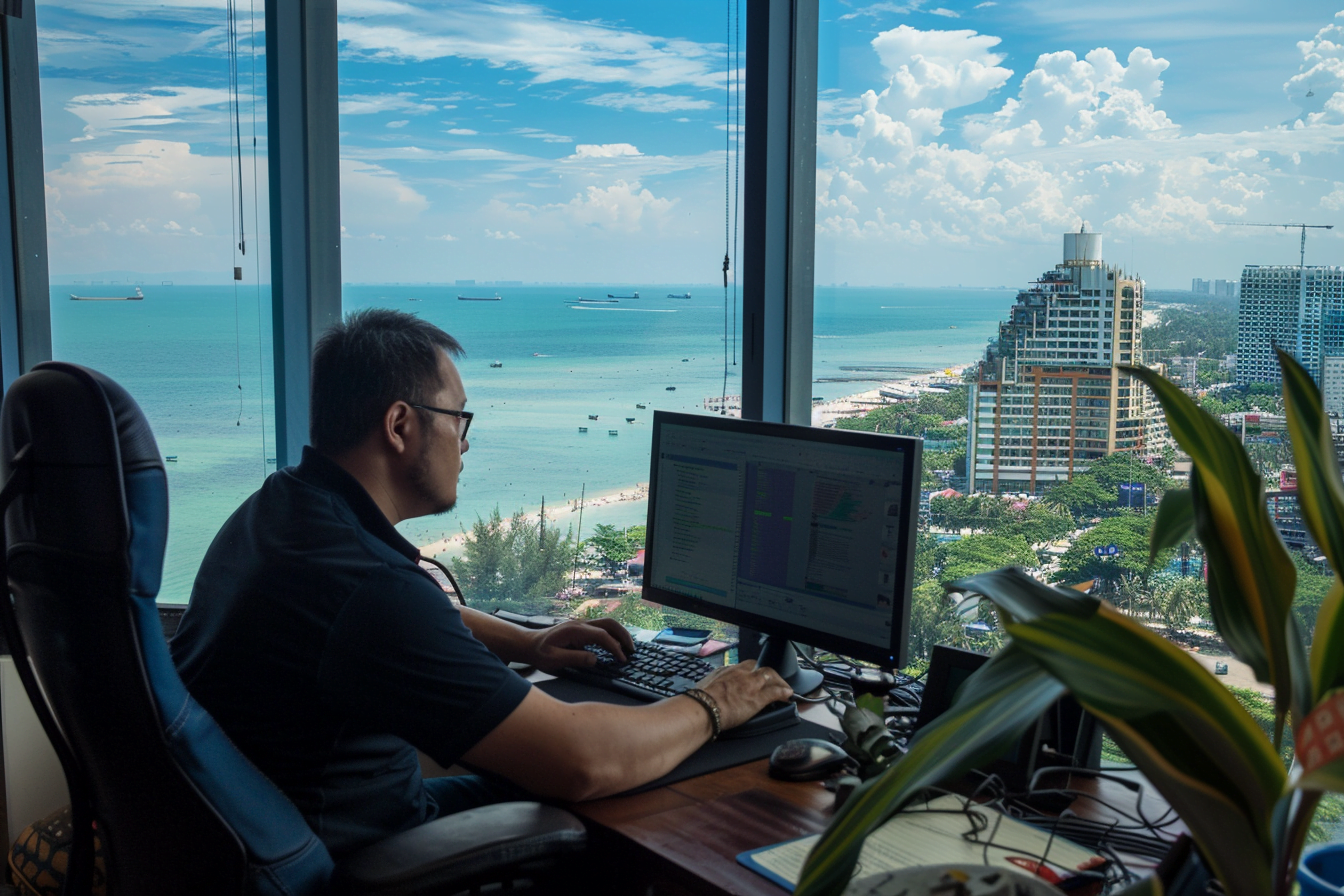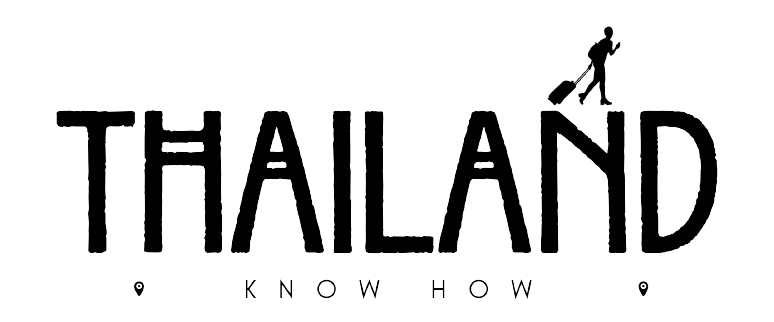Explore the vibrant work opportunities in the IT sector in Thailand, a top destination for tech professionals seeking growth and adventure.
In the heart of Southeast Asia, Thailand’s IT sector is making waves, showing no signs of slowing down. What might come as a surprise is that this vibrant country is not just a holiday paradise but also a burgeoning hub for technology professionals looking for rewarding work opportunities in the IT sector in Thailand. With an economy rich in digital innovation, Thailand’s tech industry is booming, offering an array of career opportunities in the technology sector. This Asian tiger’s Thai IT job market is currently on the hunt for skilled individuals to join its workforce of over 70 million, presenting a wealth of opportunities for expatriates with the right skillset.
Key Takeaways
- Thailand presents a dynamic Thai IT job market rich with career opportunities in the technology sector.
- Expatriates benefit from comprehensive employment legislation, guaranteeing a range of statutory benefits.
- Competitive compensation and adherence to local laws are vital for employers to attract top tech talent.
- Work permits and visas are crucial for expatriates aiming to pursue IT employment in Thailand.
- An understanding of local employment regulations is essential for maximizing the potential of work opportunities in the IT sector in Thailand.
- The tech industry in Thailand is expanding, offering diverse roles for IT professionals.
Becoming an Expat in Thailand: Navigating Work Permit and Visa Requirements
For those immersed in an IT job search in Thailand, it’s clear that delving into the essentials of work permit and visa prerequisites is a critical step towards establishing a successful IT employment in Thailand. Attaining the correct documentation is not only legally required but sets the foundation for a fruitful professional journey within the vibrant and competitive Thai IT job market.
Eligibility Criteria for Expat Work in Thailand
To uphold the standards of engaging in lawful work activities in Thailand, expatriates must meet specific eligibility requirements. This includes but is not limited to possessing relevant qualifications, experience in the IT field, and a job offer from a legitimate Thai employer. Furthermore, the alignment of one’s professional skill set with the categories of jobs that are legally open to foreigners is paramount.
Understanding Work Visa Categories
Thailand offers various visa categories tailored to different expatriate needs, including the Non-Immigrant Visa Type “B” for business and work, which is the primary visa for IT professionals. The preferred visa category is contingent on the nature and duration of one’s stay and employment. Recognizing the appropriate visa to apply for is a crucial stride in the complex journey towards IT employment in Thailand.
The Process of Securing a Thai Work Permit
Acquiring a Thai work permit necessitates meticulous attention to procedural detail. The embassy or consulate, the Ministry of Labor, the Immigration Bureau, and often, the Board of Investment, are involved in the intricate process. Expatriates must arm themselves with patience and persistency, as employers typically spearhead the arduous task of gathering and submitting all required documentation.
The following table illustrates a comparative overview of key documents typically required for IT expatriates seeking work permits in Thailand:
| Document | Requirement | Purpose |
|---|---|---|
| Passport | Current and valid for over 6 months | Identification and nationality verification |
| Visa Application | Duly filled and signed | Formal request for entry |
| Non-Immigrant Visa | Valid Type “B” visa | Appropriate visa type for employment |
| Employment Contract | Signed by employee and employer | Evidence of job offer and terms of employment |
| Educational Certificates | Authenticated as per Thai law | Proof of qualifications |
| Medical Certificate | Issued within the last six months | Health status declaration |
| Photographs | Passport-sized, recent | Required for various applications and ID cards |
By understanding these critical steps and requirements, aspiring expatriates can better navigate the complexities of securing a place in Thailand’s bustling IT sector. Employers play an indispensable role in this journey, ensuring their international talent can focus more on innovation and less on the red tape.
Overview of the Thai IT Job Market
Exploring the IT jobs in Thailand unveils a dynamic landscape rich with prospects for professionals worldwide. The Thai IT job market is rapidly evolving, fueled by a robust infrastructure and a government supportive of tech initiatives. IT career prospects in Thailand have seen a significant surge as the country becomes more integrated into the global digital economy. At its core, the availability of IT jobs and the future of IT employment in Thailand hinge on innovation, a skilled workforce, and an attractive work culture.

For those considering a technology career in Thailand, it is essential to grasp the far-reaching impact of globalization on the industry. Companies in Thailand are not just looking for IT skills but are in search of individuals who can navigate complex, international networks with agility and foresight. The local market has an appetite for experts in cybersecurity, data analysis, software development, and digital marketing, increasing the diversity of available positions.
Competition and Employment Trends
- Growing demand for IT professionals across various sectors.
- Emphasis on digital transformation driving job creation.
- Rise in competitive salaries and benefits to attract global talent.
- Preference for candidates with advanced technical skill sets and bilingual proficiency.
The Role of Statutory Benefits
The competitive nature of the Thai IT job market means that statutory benefits and compensation packages are key points of negotiation. Understanding labor laws and ensuring compliance with local regulations are paramount for companies that aspire to attract international talent. Ensuring equitable and enticing benefit structures also plays an instrumental role in career longevity and employee satisfaction, thereby influencing IT career prospects in Thailand.
| Benefit Type | Standard Inclusions | Competitive Advantages |
|---|---|---|
| Health Coverage | Social Security Fund (SSF) participation | Private insurance plans, wellness programs |
| Retirement Plans | Mandatory employee contributions to SSF | Additional employer matched pension funds, retirement bonuses |
| Professional Development | Training required for the job role | Certifications, seminars, international conferences |
| Work-Life Balance | Standard leaves – annual, sick, parental | Flexible schedules, remote work opportunities |
In sum, the Thai IT job market is burgeoning with potential, making it an opportunistic ground for those targeting IT jobs in Thailand. The focus on comprehensive benefits and adaptive work environments reflects the market’s maturity and its readiness to become an IT epicenter in the region. For individuals charting out their IT careers, Thailand offers both the challenge of innovation and the reward of personal growth.
Statutory Benefits for Expats Working in Thailand
The allure of career opportunities in the technology sector in Thailand is complemented by a suite of statutory benefits designed to safeguard the well-being of expatriates. This framework not only ensures security for today’s global professionals but also reflects the robust IT employment in Thailand.
Key Leave Entitlements for Expatriate Employees
In Thailand, expatriate employees enjoy leave entitlements that are fundamental components of their employment package. As the market opens employment for foreign nationals, understanding these entitlements becomes key to a successful integration into the local job openings in the IT industry in Thailand.
- Paid Holidays & Annual Leave
- Sick Leave with prescribed payment structures
- Maternity & Paternity Leave provisions
Health Insurance and Medical Treatment: Mandatory Inclusions
Beyond leave entitlements, health coverage stands as a mandatory inclusion, ensuring that expats have access to necessary medical care. With Thailand’s universal health care system, employers in the IT sector are mandated to cover expatriates under the Social Security Fund or provide equivalent private health insurance.
Thailand’s commitment to health care for its employees is mirrored in its extension of this benefit to the international workforce, driving growth within the field of IT employment in Thailand.
Insights into Thailand’s Social Security Fund for Foreign Workers
The provisioning of a Social Security Fund in Thailand acts as a buffer for various life situations for foreign workers. It encompasses everything from medical care to retirement, safeguarding the interests of expatriates as they contribute to the technology industry in Thailand.

| Type of Coverage | Description | Benefits for Expatriates |
|---|---|---|
| Medical Care | Access to healthcare services at empaneled facilities. | Minimized personal medical expenses. |
| Maternity Leave | Guaranteed leave for childbirth. | Financial security during and post-delivery period. |
| Pension Scheme | Contribution-based retirement plan. | Steady income source post-retirement. |
| Disability Benefit | Support in case of disability due to work or general causes. | Empowerment and financial resilience. |
| Child Support | Allowance for children of contributors. | Easing the financial requirements of parenting expatriates. |
| Unemployment Benefit | Temporary financial support during job transitions. | Security while seeking new job openings in the IT industry in Thailand. |
Understanding and utilizing these benefits can significantly enhance the experience of professionals pursuing career opportunities in the technology sector in Thailand, and form a key component in the competitive landscape of IT employment in Thailand.
Competitive Employee Benefits to Attract Talent in Thailand
As Thailand positions itself as a hub for technology careers, companies are recognizing the importance of offering enticing employee benefits to draw and retain the best talents in the IT sector. With an increasing number of IT job vacancies in Thailand, businesses are devising innovative strategies to stand out in the competitive market and cater to the varied needs of a global workforce.
Crafting Attractive Compensation Packages
Gone are the days when a singular approach to compensation could attract candidates; today’s workforce is looking for highly personalized and comprehensive benefits packages. Companies in Thailand are therefore focusing on lucrative wage structures, integrating incentives such as performance bonuses and stock options to foster a culture of shared success. Tailoring compensation strategies to fit individual profiles based on age, qualifications, and experience allows businesses to nurture a satisfied and motivated workforce.
Additional Perks: Beyond the Basics
To truly capture the interest of professionals exploring career opportunities in the technology sector in Thailand, companies are extending their perks beyond the basics. These range from flexible working hours and the ability to work remotely to wellness programs that include gym memberships and mental health support. Further embellishing these packages, businesses often include continuing education opportunities and professional development programs, reflecting a commitment to the growth and advancement of their employees. By prioritizing the personal and professional well-being of their teams, these organizations not only fill their IT job vacancies in Thailand but also enrich the job satisfaction and loyalty of their staff.
Work Opportunities in the IT Sector in Thailand

The Kingdom of Thailand, known for its beautiful landscapes and cultural richness, is also becoming an epicenter for work opportunities in the IT sector. A surge in IT jobs in Thailand has become evident, with tech companies and startups alike scouting for international talent to drive innovation and growth. Furthermore, the landscape of IT employment in Thailand is being shaped by significant investments in digital infrastructure, propelling the nation towards becoming a regional tech hub.
- Diverse Tech Roles: As Thai industries embrace digital transformation, demand for skilled IT professionals in areas such as cybersecurity, data analytics, and software development is on the rise.
- Startup Ecosystem: Thailand’s vibrant startup scene presents numerous opportunities for IT entrepreneurs and professionals seeking to be at the forefront of technological innovation.
- Government Initiatives: With government initiatives like the Digital Economy Promotion Agency (DEPA), there is strong support for the IT sector’s expansion, promising more job openings and career development options.
- Expat-Friendly Environment: Thailand offers a welcoming environment for expats, with a supportive community and services catering to the needs of international IT professionals.
The allure of Thailand for IT professionals is not only in the wealth of career options but also in the quality of life and the opportunity to engage with a rapidly evolving tech landscape. Whether you are just starting your career or looking for a significant change, the IT sector in Thailand awaits with open arms and countless possibilities.
Navigating Cultural Differences and Building a Career in Thailand’s Technology Sectors
The journey towards establishing a stable foothold in Thailand’s tech scene stretches beyond just possessing the necessary technical skills. For those eyeing technology careers in Thailand, it’s imperative to immerse oneself not only in the technological aspects but also in the rich cultural tapestry of the country. Below, we explore critical facets that expatriates should embrace to thrive in Thailand’s tech industry and maximize the IT career prospects in Thailand.
Adapting to the Thai Corporate Culture
In Thai corporate culture, the values of respect and hierarchy take precedence, demanding a level of professional decorum steeped in tradition. Successful integration into the business environment requires an understanding of local corporate etiquette which hinges on politeness, patience, and the ability to foster collaborative relationships. It is these nuances that can often define the border between a flourishing career move and a steep learning curve for expatriates navigating job openings in the IT industry in Thailand.
Language Barriers and Communication in the Thai IT Industry
Communication is arguably the bedrock of effective collaboration, yet it poses a significant challenge when dealing with the complexities of language barriers. While English is commonly used in the Thai IT sector, proficiency in the Thai language can significantly enhance an expat’s ability to engage with colleagues and grasp underlying business subtleties. Offering tailored language lessons can be a gateway for IT professionals to deepen their integration into the local culture, thereby enhancing both their personal and professional experiences in Thailand.
The pursuit of a tech career in Thailand is as much about the mastery of soft skills and cultural sensibilities as it is about technical expertise. Those who take the time to understand and adapt to the Thai way of life can look forward to rich IT career prospects in Thailand, marked by growth and meaningful intercultural exchanges.
Conclusion
In the vibrant embrace of Thailand’s robust economy, the IT sector emerges as a beacon of opportunity for expatriates. The path to professional fulfillment in this dynamic environment is paved with an understanding of Thailand’s work permit intricacies and an appreciation for the comprehensive statutory benefits available. For those embarking on an IT job search in Thailand, the journey promises not only professional growth but also a chance to immerse in the richness of Thai culture.
Enhancing Your Expat Experience in Thailand’s IT Landscape
Crafting an irresistible compensation package serves as a magnet for international talents in pursuit of work opportunities in the IT sector in Thailand. Meanwhile, diving deep into the waters of Thai traditions and business etiquette can transform an ordinary stint into an extraordinary life chapter for any expatriate. It is through the meticulous fusion of cultural sensitivity and professional acumen that one can truly secure IT employment in Thailand.
As expats embody the role of lifelong learners, adapting and engaging with the local customs and industry benchmarks, they not only contribute but also extract valuable insights and experiences. This symbiotic exchange enriches the expatriates’ tenure, rendering Thailand not merely a workplace but a canvas for personal and professional masterpieces to unfold.
FAQ
What are the work opportunities in the IT sector in Thailand?
The IT sector in Thailand offers numerous work opportunities for expatriates, ranging from software development to IT project management. The Thai IT job market is expanding and is hungry for international talent with diverse skillsets to support technological growth and innovation.
How vibrant is the career opportunities landscape in the technology sector in Thailand?
Career opportunities in the technology sector in Thailand are thriving due to government investments in digital infrastructure and the nation’s push towards becoming a technological hub in Southeast Asia. Expats can find a dynamic range of roles within this space.
What are the eligibility criteria for expat work in Thailand?
To work in Thailand, expats must meet certain eligibility criteria, such as possessing relevant qualifications, having a job offer from a Thai employer, and not engaging in occupations prohibited to foreigners. A work permit is essential for legal employment.
What are the different work visa categories in Thailand?
Thailand offers various work visa categories such as the Non-Immigrant Visa B for business and employment, and the SMART Visa for high-skilled professionals in certain industries. Each visa has specific requirements and benefits.
What is the process of securing a Thai work permit?
Securing a Thai work permit typically involves obtaining a job offer from a Thai employer, who will then sponsor the visa application. The applicant must submit necessary documents, which may include a health certificate, and a proof of address in Thailand.
What IT jobs are currently in demand in Thailand?
Thailand is in demand for IT professionals with expertise in software engineering, cybersecurity, data analytics, and AI. There is also a growing need for digital marketing specialists and IT project managers.
What are the prospects for a long-term IT career in Thailand?
The IT career prospects in Thailand are promising due to its growing economy and focus on technological innovation. Expats with the right skills have opportunities for career growth and progression in various IT fields.
What are the key leave entitlements for expatriate employees in Thailand?
Expatriates in Thailand are entitled to statutory leave benefits such as annual leave, sick leave, public holidays, and if eligible, maternity and paternity leave.
Are health insurance and medical treatment mandatory for expatriates in Thailand?
Yes, employers in Thailand are required to enroll employees, including expatriates, in the country’s social security system, which provides health insurance and covers certain medical treatments.
How does Thailand’s social security fund work for foreign workers?
Foreign workers in Thailand contribute to the social security fund, which offers benefits like medical treatment, maternity benefits, disability, child allowance, and pensions in case of retirement or death.
How can employers craft attractive compensation packages for talent in Thailand?
Employers can offer competitive salaries, performance bonuses, health insurance, and retirement plans. They can also tailor benefits to meet the specific needs of the expatriate workforce, such as relocation assistance and language training.
What additional perks can employers offer to stand out in the IT job vacancies market in Thailand?
Employers can offer perks like flexible working hours, work-from-home options, professional development opportunities, wellness programs, and team-building activities to attract and retain top IT talent.
What factors contribute to the growing IT employment opportunities in Thailand?
The growth of IT employment opportunities in Thailand is driven by factors such as government support for the tech industry, foreign investments, the digitalization of businesses, and a surge in startups requiring tech experts.
How can expats adapt to the Thai corporate culture?
Expats can adapt to the Thai corporate culture by learning about Thai business etiquette, which emphasizes respect, hierarchy, and social harmony. Being open to new experiences and showing a willingness to engage with the local community can also aid in adaptation.
What communication strategies can help with language barriers in the Thai IT industry?
To overcome language barriers in the Thai IT industry, expats can take language classes, use translation tools, and rely on local colleagues to assist with communication. Employers can also facilitate this by offering language and cultural training as part of their benefits.






Leave a reply